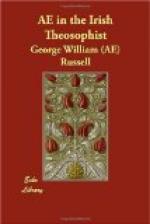Within the door at Tete Brece, under the shadow of the thatch, the couch of Cuchullain was placed, so that if he willed he could gaze over the rich green fields to the distant rim of blue hills. Yet rarely opened he his eyes or gazed with outward understanding during that weary year. Often the watchers round his bed, looking on the white rigid face, wondered if he were indeed living. But they dared not awaken him, for the seers had found that his slumber was filled with mystic life, and that it was not lawful to call him forth. Was the gloom of the great warrior because he was but the shadow of his former self, or was that pale form indeed empty? So pondered Fergus, Conail, Lugard and Ethne, faithful companions. But he in himself was wrapped in a mist of visions appearing fast and vanishing faster. The fiery hands that smote him had done their work well, and his darkness had become bright with remembrance. The majesty of elder years swept by him with reproachful glance, and the hero cowered before the greatness of his own past. Born out of the womb of the earth long ago in the fulness of power—what shadow had dimmed his beauty? He tracked and retraced countless steps. Once more he held sceptred sway over races long since in oblivion. He passed beyond the common way until the powers of the vast knew and obeyed him. As he looked back there was one always with him. Lu, the Sun-God, who in the bright days of childhood had appeared to him as his little feet ran from home in search for adventures. Remote and dim, nigh and radiant, he was always there. In solemn initiations in crypts beneath the giant hills he rose up, gemmed and starred with living fires, and grew one with the God, and away, away with him he passed into the lands of the immortals, or waged wars more than human, when from the buried lands of the past first came the heroes eastward to Eri and found the terrible Fomorian enchanters dwelling in the sacred isle. In dream Cuchullain saw the earth-scorning warriors rise up and wage their battle in the bright aether, and the great Sun-Chieftain, shining like gold, lead his glittering hosts. In mountainous multitudes the giantesque phantoms reeled to and from, their mighty forms wreathed in streams of flame, while the stars paled and shuddered as they fought.
There was yet another face, another form, often beside him; whispering, luring, calling him away to he knew not what wild freedom. It was the phantom form of the child of Aed Abrait, with dark flowing tresses, mystic eyes, her face breathing the sweetness of the sun, with all the old nobility of earth, but elate and apart, as one who had been in the crystal spheres of the unseen and bathed in its immortalizing rivers and drunk the starry dews.
Come, Cu. Come, O hero,” she whispered. “There are fiery fountains of life which will renew thee. We will go where the Sidhe dwell, where the golden life-breath flows up from the mountains in a dazzling radiance to the ever-shining regions of azure and pearl under the stars. Glad is everything that lives in that place. Come, Cu, come away.” And she passed from beside him with face half turned, calling, beckoning, till in his madness he forgot the bright Sun-God and the warriors of Eri awaiting his guidance.




